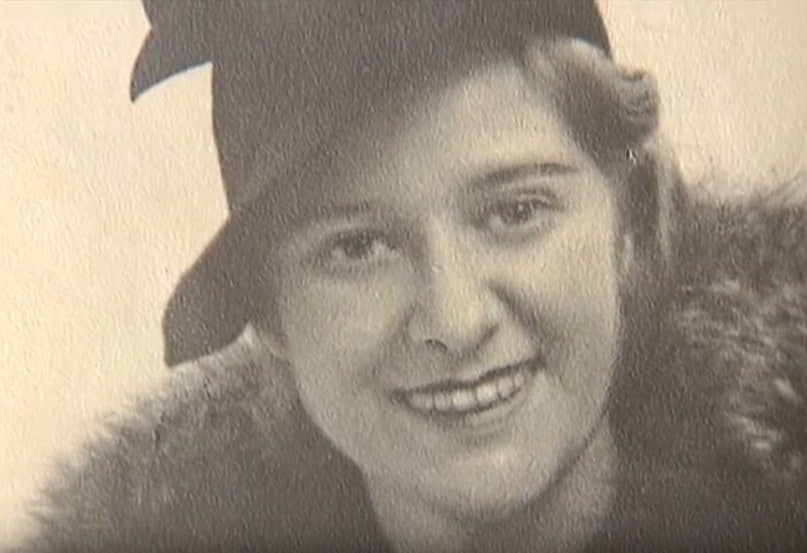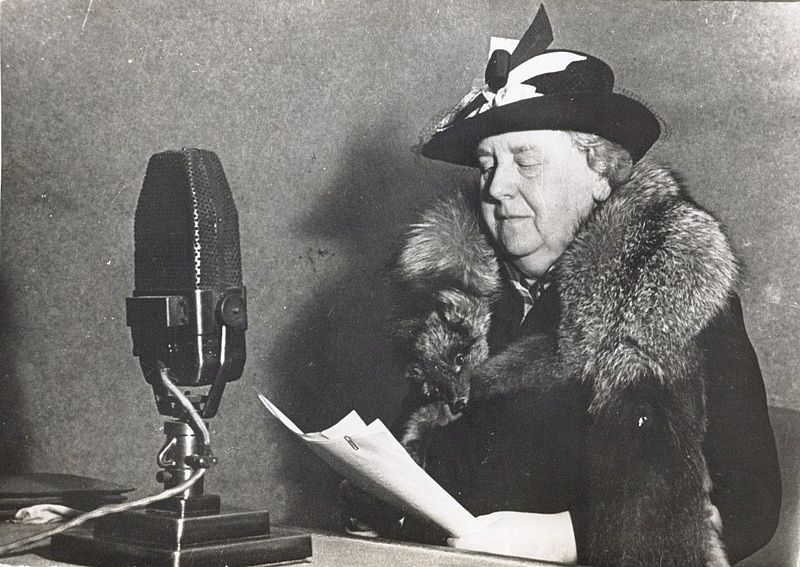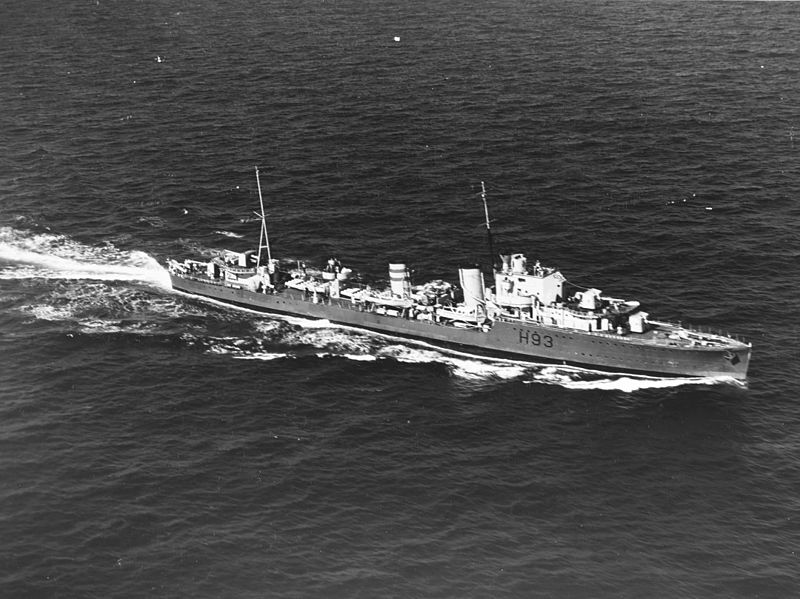
Reporting live from a shortwave radio station near the German border at the beginning of World War II, NBC’s first female correspondent, could hear the bombs begin to land outside her Dutch radio station—and so could her audience. Margaret Rupli Woodward knew it was time to go.
In May 1940, Woodward was living in the Netherlands with her husband, a British newspaperman. She’d only recently begun reporting for NBC. When CBS hired its first female correspondent, NBC felt compelled to follow suit. Woodward, an American woman in war-torn Europe with little else to do, found herself working unexpectedly as a radio journalist. She spent several months reporting on live shortwave radio, telling American audiences what was happening in the war—and now the Germans were bringing it to her door.
To flee the invading Nazis forces, the Woodwards found passage on a British coal barge, alongside the Sadler’s Wells ballet company. There was an even more important passenger in nearby waters. Queen Wilhelmina of the Netherlands escaped on a British destroyer that sailed from Holland on the same day as the coal barge. In the commotion, and using her American citizenship to her advantage, Margaret Rupli Woodward was able to smuggle out a Dutch Jewish woman’s entire wealth in diamonds by wearing them as her own.
One of very few female American radio journalists reporting from Europe during World War II, Woodward’s radio career ended after she returned to the United States. Woodward supported the war effort with a job in the U.S. Civil Service, and after the war worked with refugees and displaced persons in Europe. She went on to travel and work across the United States, Europe, and Asia. In 1958, Woodward was able to join the Foreign Service, serving as an economic officer in Ottawa, Canada. In retirement, she returned to the Washington, D.C. home she had grown up in.
Margaret Rupli Woodward’s was interviewed by Jewell Fenzi beginning January 4, 2002.
Read Margaret Rupli Woodward’s full oral history HERE.
Read more about Woodward’s broadcasting colleague, CBS correspondent Mary Marvin Breckinridge HERE. (Breckinridge later married a Foreign Service Officer.)
See other Moments on WWII.
Drafted by Natalie Friend
“Getting out was a problem. No problem for me because I had an American passport, but we had to leave because [my husband] would have been a prisoner of war as Holland fell.”

Reporting on and Escaping from the German Invasion: It seems to me that the two most interesting things for my interviewers would be the fact that I had broadcast from Holland during the War . . . and got away on a British coal barge, actually. My husband was a correspondent for the London News Chronicle, and we were in Amsterdam. We were supposed to go to Berlin, but war broke out so we went to Amsterdam instead. Getting out was a problem. No problem for me because I had an American passport, but we had to leave because he would have been a prisoner of war as Holland fell.
Q: You broadcast the invasion in 1940?
WOODWARD: Well, I couldn’t get through. The wires were down . . . . I had a broadcast all set up. I had to clear only the military censor. But I couldn’t get through. So after I’d gotten on this coal barge and got to Harwich, the same day that the queen of Holland [Wilhelmina] got to Harwich . . . . it was May the fourth. The invasion was May the tenth. I went to NBC in London and said, “I have a script. Would you like it? I couldn’t get it on in Holland.” They said, “Well, we’re really waiting for [news from] the Maginot Line [French line of defense against German advances]—what was happening there.” They said, “If we can’t get through to France, we’ll take yours.” And they did take mine, and I was very thrilled because Ed Murrow [American broadcast journalist] did that broadcast and complimented me on it.
“I got the job because they needed somebody.”
Breaking the Glass Ceiling in Broadcasting:
Q: I was just going to say, there weren’t that many women in broadcasting.
WOODWARD: The reason I got it was a sheer fluke. Ed Murrow had hired Mary Marvin Breckinridge [first female broadcaster at CBS, also subject of an ADST oral history]. And NBC had to have somebody, and I was in Holland. My husband was a newspaper correspondent, so I had access. So I went one morning—I was doing nothing and I was very bored—to the American embassy and said, “Look, can I pick up any kind of a job?” That same morning they had somebody come up from Basel [Switzerland], looking to get a woman correspondent because CBS had a woman correspondent. So they took a voice test, and my voice does project well.
Q: And you also have a nice throaty voice, which is important.
WOODWARD: So I got the job . . . . I got 25 dollars a broadcast! [Laughter]
Q: Oh, how wonderful! How long did you do that before the invasion?
WOODWARD: Until two days before. Well, until May the eighth or ninth . . . . It was only a period of about six months. Then I got back here. I’d lost all my clothes in Holland. I went into NBC here, but there was nothing for me. They offered me a 10-minute broadcast once a week at ten o’clock in the morning, or something like that; so that I decided no, I’d better go back to the Labor Department, which I did. But it was a sheer accident.
I came home on the President Roosevelt [an American steamship] and did one final broadcast from the President Roosevelt.
“I was bedecked with jewels because there was a woman . . . who had put all her money into diamonds . . . . She lived long enough to find that I had gotten them to her sister.”

Smuggling a Holocaust victim’s jewels out of Holland: I was at the German frontier—at least I was down at the broadcasting station—the night before the invasion. The soldiers had been on leave, and they’d canceled the leave and then they’d reinstated it, and it looked perfectly normal. Couples were strolling along. I got back at about two o’clock and about four o’clock my husband was awakened by a call from his stringer [a newspaper correspondent], saying that the invasion is on.
The other thing I remember is, that morning I was going somewhere—I can’t remember where—and I got on a bus. I thought I was talking Dutch, but my Dutch was very poor, and I had actually lapsed into German, because my German is good. A very nice elderly gentleman came and tapped me on the shoulder and said, “Mademoiselle, you are either English or American. We don’t want to hear German this morning!” [Laughter] “Speak English, please.”
Then, it was a question of getting down to the Hook of Holland, where the coal barge had come up from Rotterdam and discharged all of its coal and was waiting for instructions from the British consulate. I was bedecked with jewels because there was a woman, who later died in a concentration camp, who had put all her money into diamonds, and I had on a diamond watch, a diamond bracelet. And she said, “Take these to my sister,” which I did. She lived long enough to find that I had gotten them to her sister.
Q: Did you actually wear them?
WOODWARD: Oh, I wore them.
Q: So they looked like yours.
WOODWARD: Yes. And nobody questioned me. All they were interested in was, I had a dual passport. I had my passport and my husband’s passport. They were only interested in whether I had a British passport.
“It’s the first time in my life that I’ve gotten deliberately drunk. I figured, if I’m going down. . . .”

Mixed Company—A Coal Barge and a Queen: Nobody was looking at anything, because just behind the coal barge there was a destroyer with the queen of Holland and the entire staff on board. Of course, they offloaded them in Harwich before they offloaded us. My husband said, “These people down at the docks didn’t come to meet us!” [Laughter]
Q: . . . So then, you went to England on the coal barge. Is that right?
WOODWARD: Yes. And we crept around the coast. We were supposed to go shooting across, but they found out that the coast. . . . There were mines, of course. It’s the first time in my life that I’ve gotten deliberately drunk. I figured, if I’m going down. . . .
WOODWARD: Queen Wilhelmina was on the British destroyer, of course, but the Sadler’s Wells Ballet was on the barge. . . . They’d been performing in Amsterdam. There was a kind of a group of people, mixed couples, and some British aviators who had been shot down for violating Dutch neutrality and were being released and told to go home and do it again!
TABLE OF CONTENTS HIGHLIGHTS
Education
Sorbonne, University of Paris 1929
BA in French, Goucher College 1928-1931
MA in Economics, University of Chicago 1937-1939
Civil Service
London, United Kingdom—First Lieutenant, Board of Economic Welfare 1930-1931
Amsterdam, Netherlands—NBC Broadcast Correspondent with U.S. Embassy 1939-1940
London, United Kingdom—U.S. Board of Economic Warfare 1943-1945
American Embassy on Anglo-Swiss economic affairs
Washington, D.C.—Public Liaison, Displaced Persons 1947-1949
Trip to Refugee Camp in Hamburg, Germany
White Russian Refugees, from China to Germany
Joined the Foreign Service 1958
Ottawa, Canada and Washington, DC—Economic Officer 1958-1961
